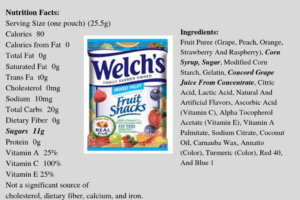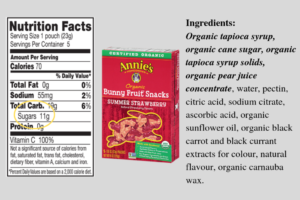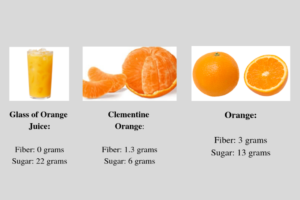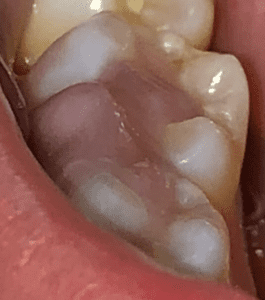Disclosure :: This post is sponsored by Lafayette Pediatric Dentistry and authored by Dr. Anita Gouri.
Four Reasons Moms Should Reconsider Fruit Snacks
Gummy Fruit Snacks – “The Natural Skittle”
I hear it all the time in my practice— “We only eat healthy things like fruit snacks in our house!” There are worse snacks you could choose, but here are some tips on reading the labels and four reasons why you should reconsider fruit snacks.
1. Fruit gummies don’t have as high an amount of sugar than some candy or junk food, but that’s about where the “healthy” stops.
Let’s take a look at the info on a packet of Welch’s gummy fruit snacks:

Fruit juice is already naturally sweet, yet they ADD both sugar and corn syrup, to make a whopping total of *11 grams* of sugar in a 0.9oz package of fruit snacks. That means the equivalent of almost 3 teaspoons of sugar per bag. Manufacturers of gummy fruit snacks entice consumers with flashy phrases like “Made with real fruit” and “Fruit is our first ingredient!” While this is all factually true, the “first” ingredient isn’t necessarily the most plentiful and the part of the fruit that makes it into the snacks is the sugary part.
2. “Well, we buy the organic kind, so it doesn’t have all that added sugar.”
Not true. Below is the nutritional info for Annie’s Fruit snacks, a popular all-organic label:

As you can see, the overall sugar content In Annie’s is equal to its non-organic counterpart, Welch’s. These strawberry gummies don’t even have strawberries in them, and the first four ingredients are four different types of sugar! Whether it’s corn syrup, tapioca syrup, nectar, evaporated cane juice, or cane sugar, the body processes it all the same way, and teeth are affected the same way. Sugar is sugar.
3. What bothers me more than the sugar content of fruit snacks is the way the fruit ingredients are processed.
The marketing is based on the assumption that the complete nutrition of a whole fruit is crammed into a convenient gummy snack. Not true! When fruit is processed into juices and purees, a lot of the healthy parts of the fruit—most notably fiber and some water-soluble vitamins—get thrown away. What part gets salvaged and packaged into your snack? You guessed it: the sugar.

Natural fruit sugar and fruit fiber are encased within the cellular walls of the fruit, which the body requires more time to break down, thereby introducing sugar in a gradual, kinder way to the body. The fiber also makes the body feel fuller, whereas a quick sugary snack can contribute to spikes and subsequent crashes in blood sugar, ultimately leading to hunger (and the inevitable consumption of more quick-fix sugary snacks)! From a dental perspective, it is always kinder to the teeth to eat sugar packaged in natural fiber instead of sugar packaged with sucrose, gelatin, and starch. Natural fruit fibers do not fuel the bacteria that live in your mouth the way sugars and starches do.
4. So, it’s just a small serving of gummies and my child eats them so fast– it’s very limited…. 
Guess again! Take a look at one of my molars 30 minutes after I ate a grape-flavored fruit gummy.
Gummies stick to the grooves of your teeth, sometimes penetrating into the deepest crevices, and remain on your teeth much longer after you’ve “finished” eating them! The “limited” impact from gummies can actually be quite prolonged! Skittles and Starburst candies do the same thing!
Moral of the story?
Try to limit these treats—they should not be a daily snack. Instead try truly healthy alternatives , such as cheese, whole grains, yogurt, and ACTUAL fruit!
Learn more about Dr. Gouri and Lafayette Pediatric Dentistry::
Website | Facebook | Instagram | Twitter
 Dr. Anita Gouri, a pediatric dentist, has been practicing in Lafayette for 10 years and is the owner of Lafayette Pediatric Dentistry. She graduated from LSU School of Dentistry in 2006, receiving honors including Outstanding Achievement in Pediatric Dentistry, Honors in Research, and the Carl A. Baldridge Academic Scholarship. She completed her residency in pediatric dentistry at Children’s National Medical Center in Washington DC in 2008 and became a board certified diplomate of the American Board of Pediatric Dentistry in 2009. In 2010, her research on dental pain assessment was published in Pediatric Dentistry. She also has specialized training in treating babies and children who have tongue and lip ties. She is a member of the Academy of Laser Dentistry, American Academy of Pediatric Dentistry, the Louisiana Dental Association, the Southwestern Society of Pediatric Dentistry, American Dental Association, as well as the C. Edmund Kells and Omicron Kappa Upsilon Dental Honor Societies. Dr. Gouri, her husband, and their two children enjoy travel, Saints football, good food and good friends.
Dr. Anita Gouri, a pediatric dentist, has been practicing in Lafayette for 10 years and is the owner of Lafayette Pediatric Dentistry. She graduated from LSU School of Dentistry in 2006, receiving honors including Outstanding Achievement in Pediatric Dentistry, Honors in Research, and the Carl A. Baldridge Academic Scholarship. She completed her residency in pediatric dentistry at Children’s National Medical Center in Washington DC in 2008 and became a board certified diplomate of the American Board of Pediatric Dentistry in 2009. In 2010, her research on dental pain assessment was published in Pediatric Dentistry. She also has specialized training in treating babies and children who have tongue and lip ties. She is a member of the Academy of Laser Dentistry, American Academy of Pediatric Dentistry, the Louisiana Dental Association, the Southwestern Society of Pediatric Dentistry, American Dental Association, as well as the C. Edmund Kells and Omicron Kappa Upsilon Dental Honor Societies. Dr. Gouri, her husband, and their two children enjoy travel, Saints football, good food and good friends.


















